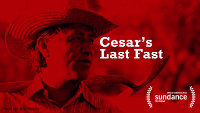
by Cory Woodroof | Oct 6, 2014 | News Slider
To co-curator Ted Parks, Lipscomb’s documentary screening series HumanDocs means far more than an earned chapel credit. Now, students who attend an installment of the series, typically nestled in a time-friendly slot on a Wednesday night, do earn a credit, but like most chapel opportunities, the impact goes far beyond the met requirement. The HumanDocs film screening series aims to teach its attendees about issues facing our world through the art of the documentary, which fits right in with the genesis of the documentary form. “My sense is that documentary has always been a form that has had an alternative distribution to commercial film,” Parks said, “and it’s always, from what I know about it, been used to raise consciousness about issues.” Parks says that at the beginning of the documentary, filmmakers were more able to pursue the issues and topics that they were passionate about because of the leniency of not working within the confines of commercial requirements. “Documentary filmmakers are not in it to make a buck,” Parks said. “They’re in it because they want to tell a story that they think will impact the world, and I really like that part of documentary film in contrast with commercial filmmaking.” Parks, an associate professor, said that HumanDocs was born out of his Hispanic Cinema class. He would have students volunteer at the Nashville Film Festival as part of the course, which got Parks wondering if Lipscomb could forge a more formal bond with the festival. “I wanted to try to develop a closer relationship between Lipscomb and the Nashville Film Festival, so talking to my colleague and...
by Emily Snell | Feb 25, 2011 | News Slider
The Human Docs’ screening of Inside Job brought an unusually large number of community members to campus Wednesday night. Ted Parks, one of the curators of Human Docs, said he thought the number of community members at Inside Job was more than most other screenings. Parks said that is what Human Docs is designed to do—bring the community and the university into discussion about social and economic justice issues. “Not only does it address issues of justice, it addresses structural issues of justice,” he said of the film. Parks said that the documentary “touches on the role of individual ethics” and “the role of government in securing justice.” The film, which explains how a long history of corruption led to the economic crisis in 2008, is nominated for an Academy Award. After the film, a Tennessee non-profit advocate and members of Lipscomb’s business faculty answered questions about greed in corporate business and government, the economic failure and the role of the individual in bringing change. Stewart Clifton, a policy advocate and attorney for non-profits, said that the corporate bankers who caused the economic failure did things that were “grossly immoral.” Clifton said that a renewed focus on personal integrity and industry regulation are necessary if America wants to avoid economic pitfalls in the future. Clifton agreed with Brad Reid, managing director of the Dean Institute, saying that individuals are crucial in creating a more honest system. He added that individuals working in community are what will truly advance positive action. “Private action affects the public as a whole,” Reid said. Reid explained that he thinks properly handling capitalism requires “careful and thoughtful”...


